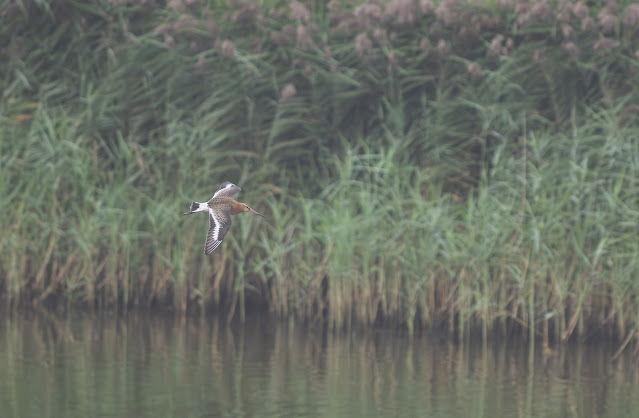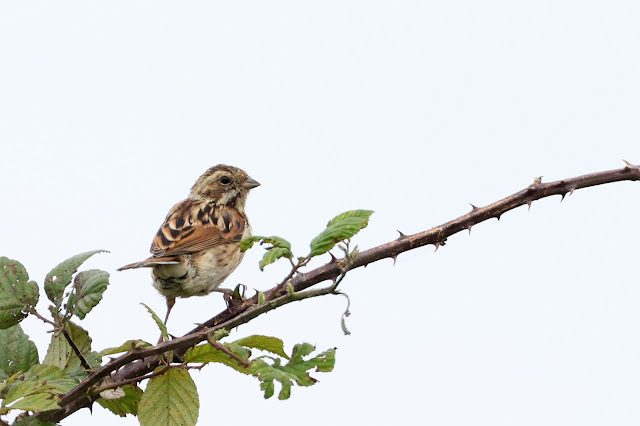 |
| Avocet (A Barrett) |
FRAMPTON MARSH RSPB
7 SEPTEMBER 2024
Driver: Glenn
Weather; See text
“After yet another wet summer the forecast for today on the East Coast was ‘fine all day with a slight easterly breeze’, and so it turned out to be with temperatures reaching 24 degrees”.
Unbelievably, these are the exact words of my weather report from the trip to Flamborough in September 2009. On this particular occasion however, we did have a sharp shower of rain mid-afternoon. Having been dry at the start or our journey it was very wet, with thick mist going over the tops and visibility down to a few yards. Unsurprisingly, no birds were reported on the journey over.
 |
| Bearded Reedling (D Axford) |
We arrived at Frampton RSPB at 11.00am, having had our usual comfort stop at Woodall Services on the M1. We were met with an extremely warm greeting from one of the many RSPB Volunteers. What would we do without them! Other volunteers were pointing out places around the reserve where various species could be seen.
 |
| Avocet (J Wharton) |
After my morning coffee, walking towards the sea wall I stopped by a small group consisting of mainly members, who were watching a male Whinchat sat atop a reed, which flew up fly-catching, before settling back on his favourite reed. ‘A first for the year’, exclaimed by many onlookers. Various duck and waders could also be seen out on the reedbed, which is apparently still under development.
 |
| Avocet (M Walsh) |
I took the path to the left, towards the 360 Hide, but was informed that nothing was to be seen from that hide as the scrape had dried up and only long grass remained. I then wandered into Reedbed Hide. Here there was plenty of water and plenty bird species to be seen. Most obvious of all and seen from every vantage point of the scrape, were the 34 Spoonbills. The largest number seen in Britain by those in attendance. Two Kingfishers were noticed flying back and to past the hide for quite a while before they both landed on mud at the edge of a nearby island and proceeded to have a fight. Eventually one bird had hold of the other by its beak and was trying to drag it into the water. After several minutes peace seemed to prevail and both birds flew off.
 |
| Whinchat (A Barrett) |
At the top of the reeds adjacent to the hide were a group of three Bearded Reedlings, later increased to 4 birds, 2 males and 2 females. I watched them for half an hour before they finally flew off to an adjacent island. From this hide (the only one I visited) could also be seen a distant Greenshank and a very large number of Black-tailed Godwits. Ruff were in plentiful supply and two Oystercatchers flew in. A couple of Sand Martins flew past and a flock of 7 Golden Plover wheeled round for a short time before departing. Before I also departed, a Yellow Wagtail put in a brief show on the mud in front of the hide.
 |
| Pheasant (D Axford) |
As I returned to the visitor centre mid-afternoon, a pair of Great White Egrets were accompanied by four Little Egrets in the wet grassland to the left of the path. A couple of members reported a Merlin sat on a gate, in the same vicinity.
 |
| Ruff (J Wharton) |
Other members were reporting a Marsh Harrier that had flown over the sea-wall from the coastal marsh and a small group of Yellow Wagtails had been seen accompanying the cattle out on the marsh. A Hobby was also reported. Curlew Sandpiper and Spotted Redshank were present in small numbers, sadly not seen by me.
 |
| Black-tailed Godwit (M Walsh) |
Earlier we had been informed of a couple of otters that had been seen before we arrived and where they had last been seen. Unfortunately, none of our members reconnected with either of these Mustelidae. Tony M. did connect with a water vole and Steve F. was fortunate enough to spot a muntjac deer in the reeds.
 |
| Yellow Wagtail (A Barrett) |
Speaking to members returning to the coach, all remarked of a good days birding, at least that it had been warm and dry, apart from the member or two caught on the sea wall during the short downpour. They were not quite as happy!
 |
| Reed Bunting (D Axford) |
BIRDS OBSERVED
 |
| Spoonbill (J Wharton) |
 |
| Wheatear (M Walsh) |

Comments
Post a Comment